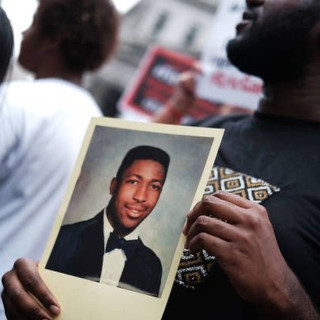A year when Black Lives (truly) Matter?
- acmassociation
- Jun 2, 2021
- 5 min read
The ACMA UK Black Lives Matter (info)series
Part 1
⚠️Warning: the following article discusses anti-Black racism. Some readers may find the writing, accompanying images and linked articles upsetting and/or triggering.
On Monday May 25th 2020, 44-year-old George Perry Floyd visited his local store, ‘Cup Foods’ in Minneapolis. Mr Floyd shopped at Cup Foods regularly and was regarded as a ‘friendly face’ by the owner, Mike Abumayyaleh. Unfortunately, Mr Abumayyaleh was not at work that fatal Monday when George visited the store to buy a packet of cigarettes.
The unnamed teenage employee who served Mr Floyd believed Goerge had paid with a fake $20 bill. According to the transcript of a 911 call made at 20:01, this employee had already attempted unsuccessfully to recover the goods sold. They believed Mr Floyd was ‘drunk’ so requested police intervention. Less than 30 minutes later, George Floyd had been hastingly shoved into the back of an ambulance where he suffered a cardiac arrest. By 21:25, George Floyd was pronounced dead at Hennepin County Medical Centre.
It would be another 10 months before former officer Derek Chauvin, who knelt on Mr Floyd's neck for little under 10 minutes (9mins and 29seconds), would be found guilty of 2nd degree murder. George had repeatedly told the officer “I can‘t breathe”. 17-year-old Darnella Frazier caught everything on her phone.
I CAN'T BREATHE.
In recent years, videos of police brutally attacking and killing people have increasingly be shared online. These moments are being caught on phone cameras, police dashboard cameras, and surveillance cameras -- and these civilians being harmed have been disproportionally Black.
The U.S Black Lives Matter movement started in July 2013, after former officer George Zimmerman, who had shot and killed 17-year-old Trayvon Martin in Sanford, Florida (February 26, 2012) was acquitted. A year later, bystander recordings of the fatal encounter between police in Staten Island and 43-year-old Eric Garner in New York (July 17, 2014) sparked a new wave of protests. Eric had just broken up a fight and was being questioned by the police about the sale of loose cigarettes. Eric repeatedly warned, “I can‘t breathe” as then NYPD officer Daniel Pantaleo pinned Eric, an asthma sufferer, to the floor in a choke hold. Eric Garner suffered a cardiac arrest in the ambulance and was pronounced dead at the hospital.
By 2015, 95% of police departments in the US reported using or imminent plans to introduce body cameras for their officers. However, research by the Lab @ Washington D.C. showed such interventions did not significantly reduce the use of police brute force.
On April 4th, 2015, dashboard and bystander camera footage show North Charleston police officer Michael Slager shooting 50-year-old Walter Scott five times in the back, as he tried to run away from a potential traffic violation. He was unarmed.
WHY, THEN, DID GEORGE FLOYD'S MURDER SHAKE THE WORLD? THREE WORDS.
CAMERAS and CORONOVIRUS.
In the U.S., Black people are 3x more likely to be killed by police than White people. You may have heard of Breonna Taylor, an emergency medical practitioner, who was shot 8-times as she slept in her apartment on March 13 2020, 2 months before George Floyd was murdered. Or Daunte Wright, who was shot and killed in his car over a traffic violation in Brooklyn Centre, on April 11 2021, during Derek Chauvin’s trial. What about Tamir Rice? Charly Keunang? Alton Sterling? Michael Brown?
According to Mapping Police Violence.org, 472 people had already lost their lives in police custody in the U.S. before the horrific murder of George Floyd, 22.5% (106) of whom were Black. Since George Floyd’s murder, 1,081 people have died in police custody in the U.S., 429 in 2021 alone. Data collected by the National Institute of Statistics shows that, in 2019, 408, 529 and 1,070 Americans died from drowning/submersion (unspecified), falling off a ladder and suffocating in bed respectively. Between 2013 and 2020, for every ten people killed by the police, three were Black (33.6%, 2,196). For context, only 13% of the U.S. population is Black (one in every ten).
BLACK AMERICANS ARE 3x MORE LIKELY TO BE KILLED BY POLICE THAN WHITE AMERICANS.
So, whilst over 1000 people are killed by police in the U.S. every year, Derek Chauvin is one of only five former officers to be charged with murder since 2015. Why, then, did the killing of George Floyd shake the world? Cameras and coronavirus.
In May 2020, almost half the world’s 7.9 billion people was locked down at home. When Darnella Frazier bravely uploaded her recording of the fatal encounter to Facebook, the world was online, and watching. The video went viral. Over the coming weeks, thousands of people would take to the streets globally every single day in peaceful protests of solidarity. Up to 26 million people are reported to have attended protests and demonstrations over 6-weeks in the U.S. The UK alone saw more 210,000 attend 100s of demonstrations within the same in period in many cities and towns including London, Birmingham, Manchester and Glasgow. For those confused about why there was such an uproar in the UK, this is your friendly reminder that the UK is not innocent. Sit tight, we’ll get to that.
THE UK IS NOT INNOCENT
In the aftermath of a global reawakening, many people, companies and organizations made big plans and momentous promises or pledges to address internal inequalities (insert black square here, #PullUpOrShutUp). What has come of these? To what extent has there been tangible progress towards the protection of Black lives over the last year? Every week for the next year, we will be exploring just that.
Our focus will be on the work happening in the UK to address anti-Black racism and systemic inequalities, specifically within our health and social care system. We will cover the work of formal and informal governing structures, as well as grass roots and student-led organisations (like UK Black Minds and Five X More, amongst many others). In light of the global nature of this (re)awakening, we will almost certainly look at the progress being made across the world.
I’m hopeful that we’ll have enough to keep us talking, at least until Black History month – but, let’s wait and see...
To Mr George Perry Floyd (October 14, 1973 – May 25, 2020).
Rest in power, Sir.

by Simisola (she/her)
tw/IG: @dr_simisola
Looking for the #BLMyear (info)series references and reading list? Click here
Join the conversation
What progress have you seen in your daily life and practice since the BLM resurgence?
What systemic changes have been or will be realised?
Have things really changed this year?
Share your thoughts!
Article Information
Author: Esther Simisola Sule, MBBS BSc.
Conflict of interest: none declared
Additional contributions: none declared.
Disclaimer: The views shared in this article are the author's own and not representative of ACMA UK or the employees thereof.
If you or anyone you know has been affected by the topics discussed in this article, do not hesitate to get in touch. We're here for you. acmassociation@outlook.com





























Comments